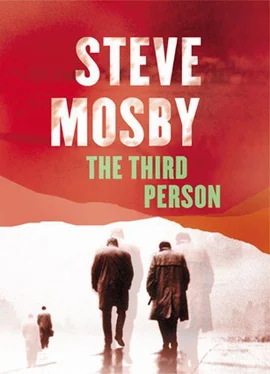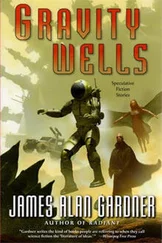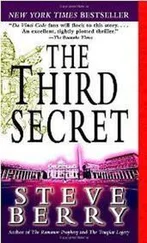Steve Mosby - The Third Person
Здесь есть возможность читать онлайн «Steve Mosby - The Third Person» весь текст электронной книги совершенно бесплатно (целиком полную версию без сокращений). В некоторых случаях можно слушать аудио, скачать через торрент в формате fb2 и присутствует краткое содержание. Жанр: Триллер, на английском языке. Описание произведения, (предисловие) а так же отзывы посетителей доступны на портале библиотеки ЛибКат.
- Название:The Third Person
- Автор:
- Жанр:
- Год:неизвестен
- ISBN:нет данных
- Рейтинг книги:3 / 5. Голосов: 1
-
Избранное:Добавить в избранное
- Отзывы:
-
Ваша оценка:
- 60
- 1
- 2
- 3
- 4
- 5
The Third Person: краткое содержание, описание и аннотация
Предлагаем к чтению аннотацию, описание, краткое содержание или предисловие (зависит от того, что написал сам автор книги «The Third Person»). Если вы не нашли необходимую информацию о книге — напишите в комментариях, мы постараемся отыскать её.
The Third Person — читать онлайн бесплатно полную книгу (весь текст) целиком
Ниже представлен текст книги, разбитый по страницам. Система сохранения места последней прочитанной страницы, позволяет с удобством читать онлайн бесплатно книгу «The Third Person», без необходимости каждый раз заново искать на чём Вы остановились. Поставьте закладку, и сможете в любой момент перейти на страницу, на которой закончили чтение.
Интервал:
Закладка:
I couldn’t think of a single person, but maybe she’d told someone else the password. After all, she hadn’t known about Claire Warner. So maybe she’d had someone that I didn’t know about.
I felt relieved to be thinking this through, without really knowing why, and so I went with it. Either Amy had sent the message, or someone else had. That seemed clear enough. It was certainly Amy in the beginning sections of the video, and the continuation in it suggested that it was her remains that had been set on fire at the wasteground. That was the implication. So she couldn’t have sent it. But who would have been able to find those videos? Certainly not Graham, not in the time he had. Hughes was dead. And why would anyone have sent me them at all?
The conclusion? Nothing about that blank e-mail made sense.
I turned it over and looked at the next page, which was the beginning of Dennison’s insane manifesto that texts were alive. As I skimmed through the pages, I wondered what state the internet was in right now: how much of it was left and how long that would last. That led to another idea. Dennison believed that the description of Amy being killed had started the corruption in the database. The text-file that got lost on its way to my inbox.
So maybe the description of Amy was behind all this. Maybe it really was alive, in some weird way. Perhaps the text itself had sent me the e-mail message, lulled into doing so by memories that were haunting it. Memories of what it once was.
I turned the page, revealing the list of ‘Marley’s in Thiene.
A flash cut of Amy’s body being carried onto the wasteground.
I glanced down the page, remembering what I already knew. There were thirty names on it, with addresses and phone numbers. Thirty strangers was too many to sift through if you didn’t know what you were looking for.
Another flash cut: a zoom.
The blurred close-up of Marley’s face, with the bright tip of his cigarette burning a hole in the screen.
I lay back down on the bed, holding the piece of paper face down against my chest, and closed my eyes.
It occurs to me sometimes that everything we think we know about ourselves is only fiction. There’s no such thing as the past or the future: they don’t really exist – in the proper, physical sense that a cat exists, or a dog. We live in this ever-changing, single moment. If I want to claim that a particular object is red, then I can point to that object. The evidence is there in front of me. But if I want to claim that it was once red – when I saw it last – there’s no physical evidence at all beyond the way the memory of me seeing it is wired up in my brain. It’s just a story I remember about the way things were. That’s the only evidence there is.
The past is all fiction. It only exists in the form of hundreds of thousands of differing narratives wired into hundreds of thousands of different heads. The stories overlap, and sometimes they contradict each other, and when that happens we tend to pick the stories which appeal to us most.
My grandmother was a religious woman and she always used to say that we were put on this Earth to do the best that we could. To make it a better place. I don’t know about that; I’m more material than she was, and less confident that anything has any real value at all. I think that it’s all just words on a page that nobody’s actually reading. But what it seems to me is this: while we’re here, what we try to do is star in as many stories as possible. That’s what being important and influential really means. It’s nothing more than binding yourself into as many narratives as possible, in as many people’s minds. And when you die, all it means is that your stories are over: you’re finished with writing them, and now it’s just a matter of whether anybody reads them and remembers you.
When I woke up, the hotel room was dark and I felt disorientated. Something was wrong. It wasn’t the light: I remembered turning it out, half-asleep, when it became obvious I was dozing off. And it wasn’t the dream I was having either, which had been cut short. It was the door.
A creak of floorboards.
Fuck – the door was open.
I swung myself upright and pulled the gun up from the side of my leg. A figure, which had been creeping into the room from the bright hallway beyond, stopped moving immediately, and then moved its hands up slowly.
I clicked off the safety catch and said:
‘What the fuck are you doing?’
‘Easy.’ It was the guy from the counter downstairs. ‘Don’t shoot.’
‘What the fuck are you doing?’ I said again.
The silhouette shrugged.
‘I heard a gunshot. It sounded like it came from in here.’
I frowned to myself in the dark. From what I could remember I’d been dreaming about gunfire – I remembered loud shots and bright lights. I’d been in a front room, watching a television.
‘I knocked, but there was no answer.’ He shrugged again, sounding more confident now. Obviously deciding that I wasn’t going to shoot him, he turned away and moved back into the doorway.
‘Got to look out for myself.’
‘Right,’ I said, as he closed the door.
The darkness felt uncomfortable, so I switched on the light and rubbed the bad dream from my eyes. The memory of it was fading, and I couldn’t remember too much of what had happened in it. But I knew that, just before I’d jerked awake, I’d been a young boy, sitting in an armchair in a dark front room. I was watching a pale blue television, which was flashing and banging away in the corner, but I didn’t like what I was seeing at all: it was pictures and sounds of people being hurt by somebody. I knew that there were other people in the room who were watching me for my reaction, and so I wasn’t allowed to look away from the screen. These other people were just vague, dark shapes in the other chairs; I couldn’t make them out, or even tell which one was speaking to me. But I remember asking:
‘Why is he doing that?’
One of them said, ‘Because if he didn’t, there wouldn’t be a story.’
I found it too frustrating. ‘That’s a stupid answer.’
The same voice: ‘It’s the only reason anyone does anything.’
And then the guy from downstairs had disturbed me.
I didn’t want to go back to sleep, so I sat on the edge of the bed for a minute, feeling sick. Whenever Amy used to wake me up in the night with one of her bad dreams, it felt like this: a kind of awful, sleepy nausea. It always passed, but never quickly. Now, as I waited to feel better, I saw that there was a screwed up ball of paper on the floor in front of me. I put down the gun and picked it up, unfolding it carefully.
Thirty names. Thirty addresses.
I put the paper down on top of the gun and held my head in my hands.
Five minutes later, I went down to the shared bathroom at the far end of the hall, with the gun tucked into my trousers. The whole room seemed strangely sterile: walls of white porcelain; garish lights overhead; and water everywhere – hanging in clean beads on the wall tiles and mixed into muddy footprints on the floor. I ran some into a sink the width and depth of a small well and splashed my face a few times, and then leaned on the edge, inspecting myself in the mirror.
I looked normal: a little tired and rough around the edges, but still me. My standard face. Neither good nor bad looking, neither smiling nor frowning – just weathered and slightly beaten, but not as much as I’d expected. I was my normal tune, played in a minor key. Water dripped down my cheeks and I saw my eyes watching it. Looked back up, only to catch them doing the same.
Thirty names.
The choice was made easier by the fact that I didn’t actually want to kill myself tonight. It felt too soon, somehow. I had a deep, aching pain inside me whenever I thought about Amy, but at the same time I felt like if I died tonight I would have missed something. There was also the small matter of cowardice; I’d be able to do it, I thought, but it would probably be easier if I surprised myself.
Читать дальшеИнтервал:
Закладка:
Похожие книги на «The Third Person»
Представляем Вашему вниманию похожие книги на «The Third Person» списком для выбора. Мы отобрали схожую по названию и смыслу литературу в надежде предоставить читателям больше вариантов отыскать новые, интересные, ещё непрочитанные произведения.
Обсуждение, отзывы о книге «The Third Person» и просто собственные мнения читателей. Оставьте ваши комментарии, напишите, что Вы думаете о произведении, его смысле или главных героях. Укажите что конкретно понравилось, а что нет, и почему Вы так считаете.












